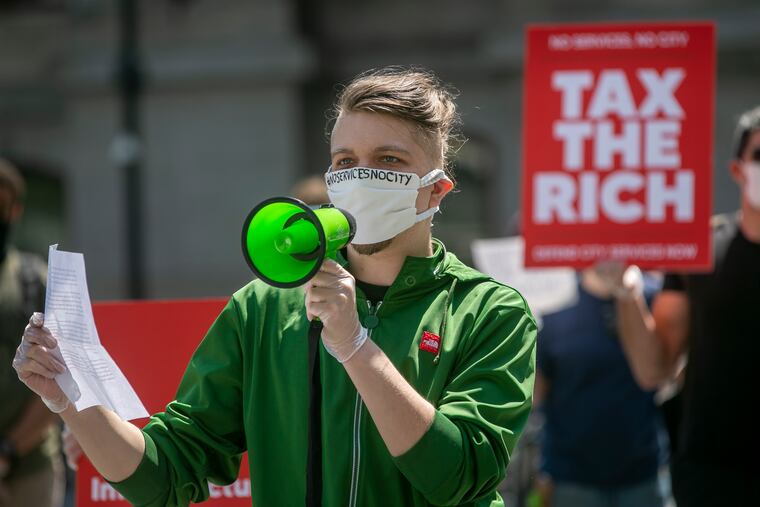Mayor Kenney, please raise our taxes | Opinion
The word “taxes” is often thrown around as a dirty word. But we don’t see it that way.

We are two wealthy, white Philadelphians who, from inheritance and salaries, have financial security during this precarious time. Looking at Mayor Jim Kenney’s gutted city budget proposal, we say to the mayor: tax us more.
We’ve often heard politicians say that while they support social services, their hands are tied because money is scarce. But when wealth inequality in our country continues to widen, can we really claim scarcity as the problem?
Budgets are moral documents that reflect our values. As wealthy Philadelphians who benefit from an unjust economic system, the moral logic couldn’t be more obvious: those who have more should pay more to meet the needs of all.
We reject the current budget proposal, which increases spending for the police while severely cutting other services. Our city has continuously disinvested in poor communities, which are, based on racist policies from our past and present, primarily black. This has helped maintain a plurality black city that is still the poorest large city in the nation. And yet wealthy, mostly white people like us are offered tax breaks like the 10-year tax abatement.
The word taxes is often thrown around as a dirty word. But we don’t see it that way. We want to live in a vibrant city that meets the needs and celebrates the talents of all its residents: strong public schools, accessible and responsive health services, active public spaces like libraries, rec centers, pools, and parks. We want the city to provide these services. If paying more taxes helps provide them, why wouldn’t we want to contribute?
We know many wealthy people, including ourselves, who give personally or through foundations as a way to distribute money. But this approach is piecemeal and anti-democratic. In contrast, paying taxes shifts power to all city residents to democratically elect officials who will make equitable decisions responsive to residents’ needs, and who can be held accountable if they don’t keep their promises.
There are a number of options for raising revenue progressively at the local, state, and federal level (including from local corporations and mega nonprofits, the subject for another op-ed). For example, as wealthy people, we can afford for the city to reimpose the Personal Property Tax at its last stated rate of 0.004. This tax applied to both individuals and corporations and was levied on stocks, bonds, and other financial assets. Litigation determined this tax to be unconstitutional because there was an exemption for the value of stock in Pennsylvania companies, leading to its repeal in 1997. We believe that motivated lawmakers could find a way to leave out this exemption, making the tax constitutional.
We are inspired by the acts of change officials are taking in other cities. Look at Los Angeles, where the mayor just announced a cut to the police budget and a reinvestment of that money into poor communities and communities of color. We challenge our city leaders to take similarly bold steps in designing a budget that demonstrates a commitment to justice.
Fellow wealthy Philadelphians, we call you to stand in solidarity with municipal workers, black and brown leaders, teachers, librarians, renters, and health-care workers, and take action. One concrete step is to join a collective effort to flood the inboxes of city councilmembers, to hold them accountable for making Philadelphia a liveable city for all. Join us in demanding a budget that ensures the city works for everyone, saying no to a city where the wealthy can buy safety, education, and wellness, while everyone else has to do without.
In a time of rampant, structural, and racialized wealth inequality, during a global pandemic, in response to legitimate and deeply felt protests about police brutality, rich people like us must pay our fair share.
Hillary Blecker is a consultant, facilitator, leadership coach, and parent who lives in West Philadelphia. Sarah Burgess is a school administrator who lives in West Philadelphia. Both are alumni of Resource Generation, which is committed to the equitable distribution of land, wealth, and power.